UCLA OMP – Classroom Module: January 13 – 24, 2020


In the January 2020 Module of UCLA OMP, during the two weeks in classroom at UCLA Anderson, you will learn from professors who are the leading experts in their fields and have won several teaching awards at UCLA and other business schools for their teaching and research. You will focus on Strategy, Entrepreneurship and its implications in the context of Family Businesses, Persuasion and Influence, Digital Marketing and Digital Channels in the context of Digital Transformation sweeping the world, the importance of and criticality of managing sales and channels and ensuring that your business is being managed well through the lens of accounting and managerial finance with the likes of Senior Associate Dean Prof. Al Osborne, Prof. Ian Larkin, Prof. George Abe, Prof. Noah Goldstein, Prof. Anand Bodapati and Prof. Andres Terech among other amazing faculty, to learn the management essentials, tools and techniques that are the building blocks of managing a modern enterprise that uses data effectively and efficiently to build brands and serve consumers and customers. You will also be spending a significant time building your project plan with Prof. George Abe, both in class and outside with a focus on developing your business plan for your current enterprise to take it to the next level. This module will build on the learnings from the Entrepreneurship online modules that you have gone through prior to coming to class and the faculty will help you apply your learning through case studies, role plays, exercises and the case competition in real life business situations. As you finish this module, you will transform your strategic management skills and develop the business plan for your organization, preparing for the next level of growth.
Faculty
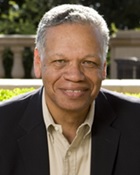
Prof. Alfred E. Osborne, Jr.
Professor
Alfred E. Osborne, Jr., is UCLA Anderson’s senior associate dean for external affairs, with oversight of a variety of key initiatives for the school, including resource development, alumni relations, corporate initiatives and executive education.
Osborne also holds an appointment as Professor of Global Economics, Management and Entrepreneurship and is the founder and faculty director of the Harold and Pauline Price Center for Entrepreneurship & Innovation. The Price Center serves to organize faculty research, curricula and student activities related to the study of entrepreneurship and new business development at UCLA Anderson.
He served as UCLA Anderson’s interim dean from July 1, 2018 to July 1, 2019.
Osborne is interested in leadership development, specifically, “how young people in this turbulent world can find their voice and develop the ability to influence a challenging environment by being powerful. This speaks to my theme of moral, value-based leadership, with an active practice of achieving desired outcomes in constructive and collaborative ways.”
Osborne’s areas of academic expertise include social entrepreneurship and the development of a leadership approach that applies business models and methodologies to the nonprofit world. Under his leadership, the Price Center created a number of management development programs, including five in partnership with health care giant Johnson & Johnson: the UCLA/Johnson & Johnson Head Start Management Fellows Program; the UCLA/Johnson & Johnson Advanced Management Institute for Head Start; the UCLA/Johnson & Johnson Health Care Institute; the UCLA/Johnson & Johnson Health Care Executive Program; and the Management Development Institute (MDI) for health care organizations in sub-Saharan Africa. Several related, innovative programs include the Institute for the Study of Educational Entrepreneurship (ISEE) and the UCLA/Los Angeles County Office of Education (LACOE) Head Start Leadership Institute.
A deep belief in the value of entrepreneurship has guided Osborne’s vision for what is possible throughout his decades-long tenure at Anderson. In addition to founding the Price Center, he facilitated infusion of an entrepreneurial approach to leadership into the Anderson culture and curriculum, including and transcending the notion of business startups.
“Societies that don’t innovate are destined to die,” Osborne says. “My view was that our MBA students could benefit from understanding things from an entrepreneurial point of view.”
Osborne combines his emphasis on innovation with a deep belief in the value of a broad-based diversity that includes demographics but, just as important, a wide range of ideas.
“The value of cognitive diversity ― the acceptance of different points of view as expressed typically by different ethnicities, genders and cultures ― is the secret sauce of the American experience,” he says.
“I think we need to respect and cherish more of that. Life experiences shape peoples’ perspectives, and someone who grew up in a different culture is the gist of construction, connection and valuable conversations. I am a product of that diversity, coming to this country from Panama. My goal is simply to encourage people to get out into the traffic of ideas and collide with somebody with a different point of view. Physicists tell me there’s no work unless there’s friction and there’s no power or energy without collisions. Let’s collide in a more inclusive and respectful way,” he says.
Osborne is an active participant in the business community, serving as a director of Kaiser Aluminum, Wedbush Inc., and First Pacific Advisors (FPA) family of mutual funds. His nonprofit affiliations include serving as a trustee of the Geffen Academy at UCLA, Fidelity Charitable, the Harvard Westlake School, and the Los Angeles Police Memorial Foundation. He served many years on the corporate boards of the Times Mirror Company, US Filter Corporation, Greyhound Lines Inc., Nuverra Environmental Solutions Inc., First Interstate Bank of California, Nordstrom Inc. and K2 Inc., among others.
While on sabbatical from UCLA in the 1970s, he was an economic fellow at the Brookings Institution and directed studies at the Securities and Exchange Commission that contributed to changes in Rule 144, Regulation D and other exemptive requirements to the securities laws designed to lower costs and improve liquidity and capital market access to venture capitalists and emerging growth firms alike.
Osborne’s research interests also include venture capital and private equity, family and closely-held business, and the role of boards of directors in private, public and not-for-profit organizations.
A corporate governance expert, he established a Director Education and Certification Program designed to help officers and directors of public, private and nonprofits prepare for the fiduciary duties and legal responsibilities of governance. This program also addresses best practices and topical issues confronting directors.
Education
Ph.D. Business Economics, 1974, Stanford University
MBA Finance, 1971, Stanford University
M.A. Economics, 1971, Stanford University
B.S. Electrical Engineering, 1968, Stanford University
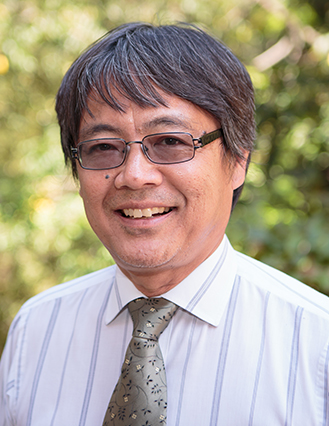
Prof. George Abe
Professor
George Abe is a lecturer at the UCLA Anderson School of Management and faculty director of the Strategic Management Research (SMR) program. SMR is the field study project required of Anderson’s Executive MBA students. He teaches entrepreneurship, business plan development and field study program advisories.
As a graduate student at UCLA, Abe studied with Leonard Kleinrock on pre-Internet data networking. In 1976 he joined Computer Sciences Corp, a defense contractor providing, among other services, timesharing services — what we now call cloud computing. He designed the IP data service for CSC’s spinoff, Infonet Services Corporation, and later signed on as business development manager at Cisco, where he became the company’s first product manager for data over cable products. In 1997 Cisco published Abe’s book, Residential Broadband, an early practical guide to what were then emerging access networks and internet technologies, published in two editions.
Abe circled back to his alma mater when he joined UCLA’s technology transfer office, where commercialization of intellectual property is managed. In 2003 Senior Associate Dean Al Osborne invited Abe to teach entrepreneurship. In his teaching, he emphasizes deal terms and team building. “Team building is the key,” he says. “Students underestimate it. They come in believing fundraising is the hardest part. The socialization process is important and overlooked.”
In addition to his experience in computer networking, Abe was a venture partner with Santa Monica-based Palomar Ventures and served on the board of directors of Switchcore AB, a publicly traded fabless semiconductor designer in Sweden, and several boards in the Palomar portfolio.
Abe serves on the board of advisers for UCLA’s Terasaki Center for Japanese Studies and Biotech Connection, Los Angeles.
B.A. Mathematics, UCLA
M.S. Business, Quantitative Methods, UCLA
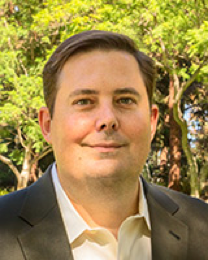
Prof. Ian Larkin
Professor
An associate professor in the UCLA Anderson strategy group, Ian Larkin’s research is focused on compensation, incentives, employee motivation and human resources. His interest in the discipline comes compliments of his first job, with McKinsey & Company, where he spent four years as an associate and engagement manager in McKinsey’s Hong Kong and Silicon Valley offices, advising senior executives on corporate strategy in the banking and high technology industries.
Larkin began his academic career as an assistant professor at Harvard Business School. He returned to his native California by accepting a position with UCLA Anderson, which he calls “an outstanding school with a top MBA program and a close proximity to Silicon Beach, where so much is going on in the technology space” — his targeted industry of interest. His primary research has ranged from the examination of corporate awards and programs that companies utilize to recognize employee performance and their potential unintended costs to decision-making influenced by various sales tactics and their respective cost outcomes in numerous industries, including technology and medicine. He is currently looking at the effects that workplace wellness programs have on employee motivation and productivity, as well as “gamification” in the workplace, which uses nonmonetary rewards to encourage improvements in employee behavior.
Larkin’s research has been published in a number of professional journals, including the Journal of the American Medical Association, Management Science, Organization Science, Journal of Labor Economics, and Strategic Management Journal, and has been cited by leading media outlets that include The Wall Street Journal, The New York Times, Newsweek, Forbes, Slate, and National Public Radio. He is an Associate Editor of Management Science, a leading academic journal in business management and strategy.
Larkin received his bachelor’s degree from the University of Arizona. He also spent time living in China, Japan and Taiwan, where he learned to speak conversational Mandarin Chinese and Japanese, which may have helped him land his first position with McKinsey. Larkin earned his Ph.D. at Haas School of Business at UC Berkeley.
When not in the classroom or conducting research, Larkin enjoys cooking (having studied the art professionally in France), traveling, writing fiction and supporting the Green Bay Packers, of which he is one of more than 360,000 individual shareholders.
Education
Ph.D. Business and Public Policy, 2007, UC Berkeley
M.Sc. Economics, 1997, University of London
B.S. Economics, Chinese Studies, Japanese Studies, 1996, University of Arizona
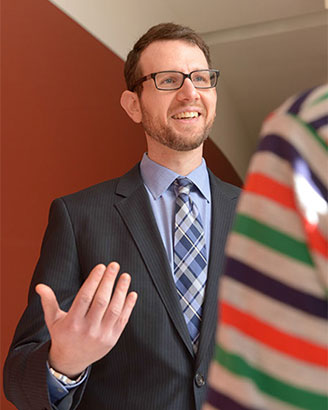
Prof. Noah Goldstein
Professor
UCLA Anderson Professor of Management and Organizations Noah Goldstein holds joint appointments at UCLA in the Psychology Department and at the David Geffen School of Medicine. His primary line of research involves the study of the factors that lead people to change their behaviors in a variety of contexts, including management, marketing and health. He has been awarded research fellowships and grants from the National Science Foundation and the National Institutes of Health, among others.
Goldstein teaches the psychology of persuasion and advises corporate and government organizations, where his insights from tested persuasion research have had substantial impact. He has also served on the Scientific Advisory Boards of two Fortune Global 500 companies.
Goldstein has coauthored two widely acclaimed books on persuasion. Yes!: 50 Scientifically Proven Ways to Be Persuasive, published in 2008, was a New York Times best-seller that has been translated in over 25 languages. He and his colleagues most recently published The Small BIG, which presents new science showing how small, often ignored changes to one’s influence strategies can pay disproportionately big dividends — all without compromising one’s ethics.
Before he was a professional behavioral researcher, says Goldstein, “I was an amateur persuasion scientist.”
At age 16, Goldstein unwittingly conducted his first controlled persuasion experiment. Working a summer job in telemarketing, he noticed the company’s standard script wasn’t exactly persuasive. So he made strategic adjustments to it and tested them on every other call he made. He very quickly found that the new pitch was far superior, leading him to handily surpass his far more experienced colleagues in sales. “That experience showed me the power of using the scientific method to go beyond anecdotes, hunches and personal experience to discover what really makes something persuasive.”
More than 20 years since his initial foray into the science of persuasion, Goldstein is still focused on what research can tell us about how to be more persuasive. He teaches his MBAs to understand what researchers have learned about the factors that make persuasion strategies maximally influential. Although his courses require a deep understanding of persuasion research and theory, his primary focus is on applying the principles of persuasion to make the students more effective influencers in their professional and personal lives. “If my students learned the theory without knowing how to apply these principles in a variety of contexts, I would feel like my job isn’t done.”
Education
Ph.D. Social Psychology, 2007, Arizona State University
M.A. Social Psychology, 2004, Arizona State University
B.S. Human Development, 2000, Cornell University
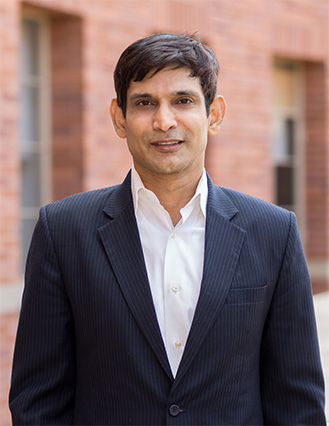
Prof Anand V. Bodapati
Professor
Professor Bodapati’s research is at the intersection of consumer psychology, decision-making, statistics, marketing and computer science. His interests lie in the development of statistical models, methodologies, decision support systems to address marketing problems in value creation, value communication, customer acquisition, customer development, customer retention and the assessment of customer response to marketing. He has worked on customer acquisition targeting, product optimization, consumer preference assessment, conjoint analysis, segmentation, advertising response, direct marketing, customer relationship management, Bayesian statistics and experimental design. Professor Bodapati’s domain-specific interested are in advertising, retailing, direct-marketing, digital marketing, and social marketing for health and public policy.
Bodapati’s papers have appeared in the Journal of Marketing Research, Journal of Business and Economics Statistics, Marketing Letters and the Journal of Interactive Marketing. He was awarded the American Marketing Association’s Paul Green Award twice. He is a recipient also of the American Marketing Association’s Lehmann Award and a finalist for the O’Dell Award for his work on recommendation systems. Bodapati was a founding member of the editorial board of the Direct Marketing Association’s Journal of Interactive Marketing and serves on the editorial board of Marketing Science.
At UCLA Anderson, Professor Bodapati teaches courses on “Digital Marketing Analytics, “Customer Analytics” and “Customer Insights and Market Research”. Bodapati has also developed algorithms for marketing technology companies such as Experian, Convertro and Bliss Point Media.
Education
Ph.D. Business, Stanford University
M.S. Statistics, Stanford University
S.B. Mathematics and Computer Science, Massachusetts Institute of Technology
S.B. Management Science and Cognitive Psychology, Massachusetts Institute of Technology
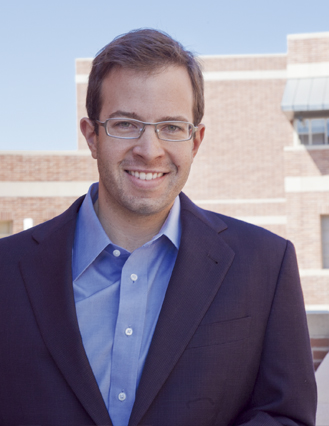
Prof. Henry Friedman
Professor
Henry Friedman is an associate professor of accounting. His research interests relate broadly to how information is produced and used in firms and capital markets. Using theoretical models and archival data, he studies issues including regulation, corporate governance, managerial incentives, noise in stock prices and returns, and investor preferences.
At UCLA Anderson, Friedman teaches introductory financial accounting and runs an online pre-term course to help entering students prepare for their first-year accounting class. At the University of Pennsylvania, Friedman taught core managerial accounting and helped teach entrepreneurship and materials science and engineering courses as a graduate fellow for the Innovation and Technology Management course.
Education
Ph.D. Accounting 2012, University of Pennsylvania
M.A. Accounting 2012, University of Pennsylvania
B.S. Economics 2007, University of Pennsylvania
B.S. Materials Science and Engineering 2007, University of Pennsylvania
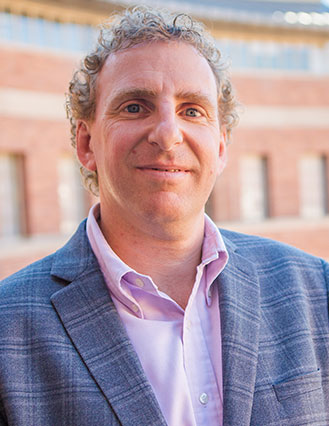
Prof. Andres Terech
Professor
Working as a consultant at Accenture in his home country of Argentina, Andres Terech (Ph. D. ’04) became a victim of the Mexican government’s decision to devalue the peso against the U.S. dollar in 1994. The “tequila effect” that this action had on the South American economy was the prime reason Terech left consulting and took advantage of a full EMBA scholarship at IAE Business School, Universidad Austral in Buenos Aires, before receiving a second scholarship to earn a Ph.D. at UCLA Anderson in 2004.
He began his academic career as an IAE faculty member in 1997, teaching MBA students and executive programs. After he received his Ph.D., Terech traded southern hemisphere summers for winters, traveling north to the U.S. to teach elective courses and conduct research as a visiting professor at UCLA Anderson. He later became a full-time adjunct associate professor of marketing in 2009.
It’s not surprising that Terech’s strongest area of research is in retailing and includes modeling consumer choice behavior and competitive market structure.
“I grew up in the retail environment, as my family had two stores in a town north of Buenos Aires,” he says. His consulting experience covers several marketing challenges, such as new product launches, marketing plans and growth strategies, promotion and communication programs, distribution strategy, pricing and sales promotions, and feasibility analysis. He has advised startups and Fortune 500 clients in a variety of industries, including retailing, agribusiness, financial services, textile and automobile, and sits on the advisory boards of several start-up companies.
Terech’s current work focuses on studying the integration of different methods of shopping available to consumers and retailers performance metrics. He takes a special interest in marketing issues related to branding, pricing, franchising and retailing — evident in the Latin American Franchising Research Council (CLIF) he founded in 2007 in Argentina, which brought together academics and franchisors to help promote intellectual leadership in franchising. He teaches courses in pricing, marketing strategy, marketing analysis and frameworks, retail management, and sales force and distribution channel strategy. He has also taught executive seminars at different business schools in Spain, Mexico, Chile, Peru, and Ecuador.
He enjoys writing cases for publications, describing it as “the ideal way to connect theory and practice, to provide real context to frameworks and theories.” Much of his work has been published in scholarly journals and specialized business publications, such as Case Research Journal, Marketing Letters and Harvard Business Review. When not focusing on his research, Terech can be found occasionally on a basketball court, coaching soccer and baseball, or taking the family on yearly camping trips.
Education
Ph.D. Marketing, 2004, UCLA Anderson School of Management
MBA 1997, IAE Business School, Universidad Austral
B.A. Business Administration, 1994, Universidad de Buenos Aries
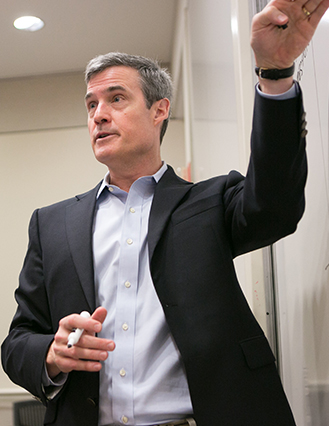
Prof. Randolph E. Bucklin
Professor
Studying markets at the level of the individual consumer has been Professor Randy Bucklin’s passion since he earned his Ph.D. from Stanford University in 1989. His work is designed to aid companies as they make a wide range of marketing decisions, including pricing, advertising, promotions and sales channels. “The critical thing is to understand marketing data at a rich and granular level,” says Bucklin. “From there, you can aggregate to any level you like.”
Bucklin’s award-winning work has advanced with the times. Originally, his research looked at data culled from bar codes and focused on consumer packaged goods. Today, his quest to understand consumer choice behavior focuses on Internet marketing and advertising. He now utilizes clickstream data sources that track the browsing and purchasing behavior of consumers on the Web in real time. The impact of his recent work has been highlighted by winning the 2015 and 2016 William F. O’Dell Award, a very prestigious prize that recognizes articles with the greatest long-run impact in marketing.
A versatile instructor, Bucklin has taught a variety of marketing courses at Anderson, including the required core course, sales and channel management, and price policies. “I consider teaching a special role that allows me to pass knowledge on to my students,” says Bucklin, who has received five teaching awards since joining the school. “It’s a real privilege to have as much of an impact as you can.”
Throughout his career, Bucklin has made numerous contributions to his field. These include co-editing the Journal of Marketing Research (2014–2016), co-editing Marketing Letters (2006–2010), co-chairing the INFORMS Marketing Science Conference in 2000 and co-chairing the Marketing Dynamics Conference in 2006. As a UCLA Anderson faculty member, his administrative service has included serving as faculty chairman and deputy dean from 2012 to 2015, serving two terms as marketing area chair and serving as chair of Anderson’s MBA Curriculum Committee from 2001 to 2004.
Education
Ph.D. Marketing, 1989, Stanford University
M.S. Statistics, 1987, Stanford University
A.B. Economics, 1982, Harvard University
Learning Objectives:
By the end of the first in-class UCLA module, you will be able to:
- Understand the process of building a robust strategy for your business
- Evaluate the competitive strategies of other players using game theory principles
- Ensure that you develop a solid plan for executive your strategy and deploying it in the context of your business
- Develop a feedback loop to keep your strategy updated and valid as the business environment evolves
- Use the business model canvas as an effective tool to plan your entrepreneurial efforts
- Explore the blue ocean strategies to craft a value proposition that differentiates you from your competitors
- Delve deep into the issues of family business sustenance and growth over generations
- Ensure that you put together a good governance structure for your organization
- Develop the ability to lead your organization and the senior team through effective persuasion and influence
- Create a mechanism to drive scale through a focus on the sales and channels appropriate to the context of your business
- Drive digital transformation in your organization as a mechanism for growth and readiness for the current business context
- Use the appropriate accounting tools to measure the health and performance of your business and ask the right questions
- Analyze the current performance of your business to drive future growth and bring all your learning together to act on the business plan for your venture
Classroom Methods:
The classroom module will use various exercises, case studies, team assignments and class discussion to bring alive the complexities in the subject areas. You will also spend time on building and refining your own business plan that will help you resolve the complexities of a new business area (or your won business) and apply your learnings from within the program as well as your personal experiences to find solutions to be applied when you return. It is required that you go through all the assigned cases as well as pre-reads and prepare for the session before the class. It will be greatly beneficial for you and the other participants to go through the material provided, including online modules, so that the discussion can be rich, and help clarify details with the faculty members during the in-class session.
Support
Please email [email protected] for any support required with respect to the program, course or platform.
